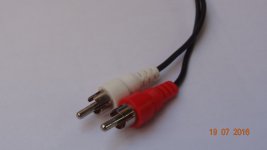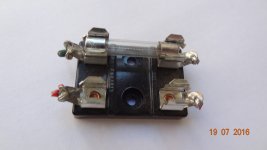What about that that cake they eat here in the UK with custard called a 'spotted dick'
https://en.wikipedia.org/wiki/Spotted_dick
https://en.wikipedia.org/wiki/Spotted_dick
Audio connections normally are formed with significant mechanical force. All IC's and discrete devices are made with lots of mechanical connections of differing metals how could you even make an AP? Did you see the connectors on that pico-voltmeter, you crank them down HARD.
No. Audio connections are not Normally formed with significant mechanical force. Neither RCA nor XLR contact have high clamping force, Normally.
 Normal RCA.
Normal RCA.Maybe yours or my audio connector is air tight contact etc. But that is not the normal RCA most people use. To say they Are air tight connections, normally, is to imply there is no contact issue with Normal RCA contact/connection.
I have some RCA (gold) that are so tight they are very hard to remove. Some audiophile RCA have collars which tighten down and provide an air- tight contact.
But, Normal? No.
[BTW--- the info i put up is for everyone and contains info of varying interests beside what we might be directly talking about.]
THx-RNMarsh
Last edited:
Evidently we should be driving trees. Not those hunks of iron.
(as should be common knowledge, owners of fancy diver watches in 18k gold never go beyond jacuzzi depth)

Top notch post here.
Keep the spirits high Jacco
George
No. Audio connections are not Normally formed with significant mechanical force. Neither RCA nor XLR contact have high clamping force, Normally.
View attachment 560784 Normal RCA.
Maybe yours or my audio connector is air tight contact etc. But that is not the normal RCA most people use. To say they Are air tight connections, normally, is to imply there is no contact issue with Normal RCA usage.
I have some RCA (gold) that are so tight they are very hard to remove. Some audiophile rca have collars which tighten down and provide a tight contact.
But, Normal? No.
[BTW--- the info i put up is for everyone and contains info of varying interests beside what we might be directly talking about.]
THx-RNMarsh
Okay. If you're comparing to that then cables really do make a different.
No. Audio connections are not Normally formed with significant mechanical force. Neither RCA nor XLR contact have high clamping force, Normally.
Yes Dick you're so right, that article you posted referred to metal on metal contacts with NO mechanical force at all. As I said, you didn't read it. Have it your way but please post some actual data or measurements that show something for folks to worry about in ordinary audio applications. Most RCA equipment I have takes a good push to seat the connector my idea of significant mechanical force YMMV.
Remember the potatoes.
Last edited:
The fundamental problem with the RCA interface is the difficulty in ascertaining if the force required for insertion is applied to the center pin or the shell, or both. The absence of a real standard for the dimensions is part of the problem.
Recall that these were intended for few-cycle internal connections within things like TV sets.
One of the reasons I might purchase "audiophile" interconnects is that their connectors are usually of higher quality, including ones that have a slotted pin and shell. In one case I had to repair one on receipt because of a broken solder connection, but so it goes.
Recall that these were intended for few-cycle internal connections within things like TV sets.
One of the reasons I might purchase "audiophile" interconnects is that their connectors are usually of higher quality, including ones that have a slotted pin and shell. In one case I had to repair one on receipt because of a broken solder connection, but so it goes.
I have an old pair of Monster interconnects that are made to go on so tight on the outside barrel you can't get them off without the possibility of damaging the chassis side connector, way to much mechanical force as far as I'm concerned. What is the problem with having to clean RCA connections every few years or so, I have never seen a real problem if they are cleaned to begin with and taken on and off once in awhile.
Scott, I am sure somewhere there is such information.... I do have some books on contact behavior/metallurgy in switches and relays. Most are about reliability. Whats a little distortion matter?
This is the fuse holder type used by Magnapan when I heard the distortion and found it was from this fuse holder/fuse combo. Too bad I didnt have the distortion gear I have today to measure it. I replaced it with a fuse holder which was similar but gold plated clips (I wonder why they made those? )
)
You would think the contact force was good enough. But it wasnt air-tight apparently.

An alternative to replacing the holder is to use gold plated end caps on the fuses. Littlefuse has them and so others do also. 028506.3 - 285 Series - 5x20mm Fuses Cartridge Fuses from Fuses - Littelfuse
THx-RNMarsh
This is the fuse holder type used by Magnapan when I heard the distortion and found it was from this fuse holder/fuse combo. Too bad I didnt have the distortion gear I have today to measure it. I replaced it with a fuse holder which was similar but gold plated clips (I wonder why they made those?
You would think the contact force was good enough. But it wasnt air-tight apparently.

An alternative to replacing the holder is to use gold plated end caps on the fuses. Littlefuse has them and so others do also. 028506.3 - 285 Series - 5x20mm Fuses Cartridge Fuses from Fuses - Littelfuse
THx-RNMarsh
Last edited:
One of the reasons I might purchase "audiophile" interconnects is that their connectors are usually of higher quality, including ones that have a slotted pin and shell. In one case I had to repair one on receipt because of a broken solder connection, but so it goes.
There are plenty of sources of relatively cheap gold plated better quality RCA's, I never said save the throw away connectors you get with your VCR.
We have a lab full of 30-40 yr. old test gear plenty of which no longer shows very shiny gold on the center pins as well as tons of cheap Pomona RG58 test leads which definitely are not shiny anymore i.e. significant oxidation. No rash of problems except a rare yes or no connection on a particularly bad one. Yes the connections are regularly simply made and remade that's the way it is in a lab.
Last edited:
I was bringing up a breadboard the other day and getting bizarre results. It turned out a Pomona short banana-to-banana plug jumper, which was supposed to establish a common connection between the sections of a dual power supply was becoming intermittent, but it was the last part of the setup I suspected. Finally the wire came out completely! Of course I'd gotten many years of use from the cable. But it was a definite fall-from-grace moment, as I had come to regard it as unbreakable given careful handling (I wasn't pulling it out of jacks by the wire).There are plenty of sources of relatively cheap gold plated better quality RCA's, I never said save the throw away connectors you get with your VCR.
We have a lab full of 30-40 yr. old test gear plenty of which no longer shows very shiny gold on the center pins as well as tons of cheap Pomona RG58 test leads which definitely are not shiny anymore i.e. significant oxidation. No rash of problems except a rare yes or no connection on a particularly bad one. Yes the connections are regularly simply made and remade that's the way it is in a lab.
The "audiophile" cable in which I had a bad solder connection was a Monster product. The RCAs are slotted for both shell and center pin, and thus accommodate some appreciable variation in jack dimensions. And you can spread the center pin ones easily, the shell ones with a bit more difficulty.
In the spectrometer I had some interconnections made with SMAs. A lot of the parts came from a zoology professor who got a lot of government excess property with the somewhat-shaky justification that he used the stuff for his experimental work with nocturnal animals.
I had a candidate for a tech job who showed up with a politically-incendiary newspaper under his arm. He lit up when the saw the SMAs, convinced that the instrument had something to do with electronic warfare and multi-GHz bandwidths. He wouldn't accept the idea that they were for much lower frequencies. Needless to say he didn't get the job.
We have a lab full of 30-40 yr. old test gear plenty of which no longer shows very shiny gold on the center pins as well as tons of cheap Pomona RG58 test leads which definitely are not shiny anymore i.e. significant oxidation. No rash of problems except a rare yes or no connection on a particularly bad one. Yes the connections are regularly simply made and remade that's the way it is in a lab.
So do I. This is key though..... remove and insert periodically breaks thru the oxide film. Audiophiles can do same if they think to do it with their RCA's. Insert and rotate a few times cleans the contact of oxide. But, really. is this the norm in the home hi-fi system. No. they insert and forget it.
Better to have gold contacts for home audio.... truely can forget it (if platting is >50uinches)
THx-RNMarsh
Last edited:
- Status
- Not open for further replies.
- Home
- Member Areas
- The Lounge
- John Curl's Blowtorch preamplifier part II